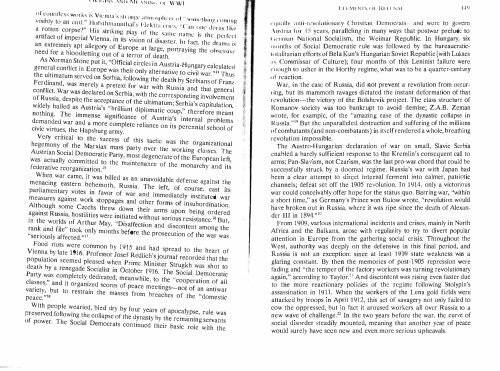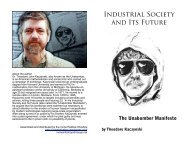CONTENTS - ouroboros ponderosa
CONTENTS - ouroboros ponderosa
CONTENTS - ouroboros ponderosa
Create successful ePaper yourself
Turn your PDF publications into a flip-book with our unique Google optimized e-Paper software.
'; ("rc dN" ·\ NJ , 1\.1 1 .\ NINI , ()l \V WI<br />
of C()L11l (kss works is V it; nlla 's sl r:lIIg(" ;lI lIlo. ... phl" 1(· t)' · · .... Ollll·' hi II}'. ("nrll i II<br />
visihly tll an nd ." Hofsthmallllthal's I'Jl'klra nil·s . .. ( 'an (Jill' Iir'cay Ii . ..<br />
a rotten corpse'!" His slriking play of the ,alll lIam is thl ' perkl'l<br />
artifact of imperial Vienna, in its vision of disaste r. III fact, the drama is<br />
an extremely apt allcgory of Europe at large, portraying the obsessiVl'<br />
need for a bloodletting out of a terror of death.<br />
As Norman Stonc put it, "Official circles in Austria-Hungary calculated<br />
general conflict in Europe was their only alternative to civil war. , ," Thus<br />
the ultimatum served on Serbia, following the death by Serbians of Franz<br />
Ferdinand, was merely a pretext for war with Russia and that general<br />
conflict. War was declared on Scrbia, with the corresponding involvemcnt<br />
of Russia, despite the acceptance of the ultimatum; Serbia's capitulation,<br />
widely hailed as Austria's "hrilliant diplomatic coup," therefore meant<br />
nothing. The immense significance of Austria's internal problems<br />
dcmanded war and a more complete reliance on its perennial school of<br />
civic virtues, the Hapsburg army.<br />
Very critical to the Success of this tactic was the organizational<br />
hegemony of the Marxian mass party over the working classes. The<br />
Austrian Social Democratic Party, most degenerate of the Euro p ean left,<br />
was actually committed to the maintenance of the monarchy and its<br />
federative reorganization."<br />
When war came, it was billed as an unavoidable defense against the<br />
menacing eastern behemoth, Russia. The left, of course , cast its<br />
parliamentary votes in favor of war and immediately instituted war<br />
measures against work stoppages and other forms of insubordination.<br />
Although some Czechs threw down their arms upon being ordered<br />
against Russia, hostilities were initiated without serious resistancc." But,<br />
in the worlds of Arthur May, "Disaffection and discontent among the<br />
rank and file" took only months before thc prosecution of the war was<br />
"seriously affected.""<br />
Food riots were common by 1915 and had spread to the heart of<br />
Vienna by late 1916. Professor Josef Redlich's journal recorded that the<br />
popUlation seemed pleased when Prime Minister Strugkh was shot to<br />
death by a renegadc Socialist in October 1916. The Social Democratic<br />
Party was completely dedicated, meanwhile, to the "cooperation of all<br />
classes," and it organized Scores of peace meetings-not of an antiwar<br />
variety, but to restrain the masses from breaches of the "domestic<br />
pcace. "18<br />
With people wearied, bled dry by fo ur years of apocalypse, rule was<br />
preserved following the collapse of the dynasty by the remaining servants<br />
of power. The Social Democrats continued their basic role with the<br />
,<br />
,<br />
' .!<br />
,<br />
,<br />
',: 1<br />
I '.I I· MI'N"'\ ( 'I · RI · J· ( IS.-\I I ,I')<br />
. ('J , ' ,<br />
('q(l:olly ;(llli-rl'vIlI(lllllll"ry , ll lStl,1Il '. I) ·moerats· and were to govern<br />
' ,<br />
'<br />
'\<br />
.<br />
, (lst , I :I 1 m I .' e ye,1 .. rs " parallelong on many e ways that postwar prelude to<br />
'<br />
.<br />
.<br />
1 ;('J'I11"1I NatIonal SoCla ' r ,sm, the We,mar R epu bll'c . In Hunoary 0 ' SIX<br />
.<br />
,<br />
"" >I1ths ot SOCial ' 0 emocr at'c " rule was C .0 II owe ' d by the bureaucratlc-<br />
. .<br />
'"Ialltanan e t'f' orts 0 f B e la Kun s H unganan . SovI'et Republic (with Lukacs<br />
:0' Commissar of Culture); four mon th of this Leninist failure were<br />
(,Ilough to usher in the Horthy regIme, w at was to be a quarter-century<br />
.. I' reaction.<br />
.<br />
.<br />
f R I War, 10 th e casc 0 ussla , d'd not prevent a revolution from occur-<br />
.<br />
nng, ' b ut I 't s mam . moth ravages d' IC t a t e d the instant deformation 01 . t h at<br />
. .<br />
revolution-the VictOry 01 the Bolshcvik . project. The class structure 0 f<br />
.<br />
Romanov society was t 00 bankrupt to avol 'd deml'se' , Z . A . B . Zeman<br />
"amazin ease of the dynastic collapse in<br />
w rote,<br />
o<br />
RUSSia. But the II 'n p !r:I:let1 destrction and suffering of the milli<br />
<br />
ns<br />
: examplc<br />
of combatants (and non-com b atan t s ). 111 1 'tself . rendered a whole, breathlllg rcvolution impossible.<br />
.<br />
.<br />
H garian declaratIon a ,<br />
The Austro- un<br />
enabled a barely sufficien: respo:<br />
arms; Pan-Slavlsm, not Czansm' :e<br />
f war on small Slavic Serbia<br />
t h Krcmlin's consequent call to<br />
I:st pro-war chord that could be<br />
d . Russia's war with Japan had<br />
successfully struck by a doomc , rcg l m rfer m ent i n to calmer, patriotic<br />
been a clear attempt to dl r n: ution. In 1914, only a victorious<br />
channels; defeat sct off the<br />
war could conceivably offer hope for the status quo. Barring war, "within<br />
a short time, . " as G erm any's Pnnce von B u low wrote , "revolution would<br />
. .<br />
have broken out in Russia, where It was np e since the death of Alexan-<br />
der III in 1894,"w<br />
From 1909, vanous mtcrna . t' to n I incidents and crises, mainly in North<br />
WI<br />
th<br />
Africa and the Balkans, arose r e g ularity to try to divert popular<br />
attention in Europe f rom the gathenng socia ' I cnSIS. " Throughout the<br />
West, authonty was deep l y on the defensive in this final period, and<br />
. .<br />
RUSSia IS no t an exceplion. .<br />
' smce at I ea, 'st 1 "09 7 state weakness was a<br />
. . .<br />
glanng constant. B y then the memones . 0 f' post -1<br />
905 repression were<br />
.<br />
f· a d' lIlg and<br />
"the tcmpcr 0 f thc factory workers was turning revolutIonary<br />
. 21<br />
A d d' ontcnt was rising even faster d ue<br />
again," accordmg to Taylor. r? IC the regime following Stolypin's<br />
to the more reactionary po lles 0<br />
assassination in 1 911 . : h n<br />
k of the Lena gold fields were<br />
l l : : attackcd by troops i of s<br />
111<br />
avagery not only failed to<br />
p<br />
cow the oppressed, but n f i; aroused workers all over Russia to a<br />
, ;n act<br />
I new wave of challeng·<br />
<br />
e two ears before the war, the curve of<br />
social disorder stea dI<br />
y m u ed , maning that another year of peace<br />
.<br />
would surely have secn ncw and even more senous . u pheavals .






